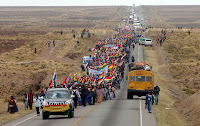) - On Monday, thousands of Bolivians kicked off a march from Caracollo, Oruro on their way to the capital city of La Paz.
President Evo Morales led the first few miles of a week-long march that will cover 124 miles and end on the steps of the National Congress.
Various social sectors joined the march that was organized by the National Coordinator for Change (CONCALCAM) with the principal demand that Congress approve a law which will pave the way for a referendum vote on Bolivia’s new constitution. The mobilization also demands legislators legalize voting for Bolivian citizens who live abroad.
Morales was received warmly by his supporters, who took him up to a small altar prepared for an Andean ritual, where Morales made up offerings to Pachamama (Mother Earth) for the success of the mobilization.
"We hope that the people in Congress, the opposition, see the Bolivian people's efforts and approve the constitutional reforms," Morales said.
The president also called on farmers living along the route to provide food and accommodations for the marchers who arrived from different points throughout the country and were armed with small flags and copies of the draft constitution.
Commencing the mobilization with a few thousand marchers, by Wednesday that number had grown to at least 15,000, as reported by Telesur.
 According to Presidential Spokesman, Ivan Canelas, this demonstration is historic. Although long marches have been a method of protest and activism within Bolivia by miners and indigenous peoples in the past, never before have so many different sectors participated in these demonstrations.
According to Presidential Spokesman, Ivan Canelas, this demonstration is historic. Although long marches have been a method of protest and activism within Bolivia by miners and indigenous peoples in the past, never before have so many different sectors participated in these demonstrations.
Marchers include workers, peasants, coca growers, indigenous settlers, peasant women, university students, rural teachers, factory workers, entrepreneurs and others.

Fidel Surco, president of CONALCAM indicated that the march, supported by the largest unions in Bolivia and numerous social sectors, will conclude on Monday, October 20th in La Paz. At first the march was planned as a protest, with thousands converging to surround the National Congress building at the Plaza de Armas, but the event has been restructured to instead mark a democratic celebration.
The opposition is vehemently against the referendum, which is needed in order to put the draft constitution before the Bolivian people for a vote. They claim the draft charter does not meet their demand of greater autonomy.
The opposition-controlled eastern provinces of Beni, Chuquisaca, Pando, Tarija, and Santa Cruz have all sought greater autonomy and control over local resources, holding departmental autonomy referendums unsanctioned by the national government in recent months.
President Morales has repeatedly expressed a willingness to include departmental autonomies in the new charter - an issue that remains at the root of the opposition’s resistance to the central administration in La Paz.
On Monday, Morales invited the opposition prefects to participate in the demonstrations that support a constitutional referendum.
"If the Prefect in Santa Cruz, Ruben Costas, Mario Cossio in Tarija, {other} Prefects, and civic committees wish departmental autonomies, they would have to be in demonstrations for establishing indigenous, rural, and departmental autonomies," said Morales according to ABI.
Social sectors hope the mobilization will convince legislators that they must approve a referendum law. Morales party Movimiento al Socialismo (MAS) controls the lower house of Congress, but the right-wing opposition holds a majority in the Senate. The referendum law must pass both houses in order to become law and permit the December 7 referendum vote sought by Morales and his supporters.
Photos: ABI
|
|
|





0 Comments:
Post a Comment
<< Home